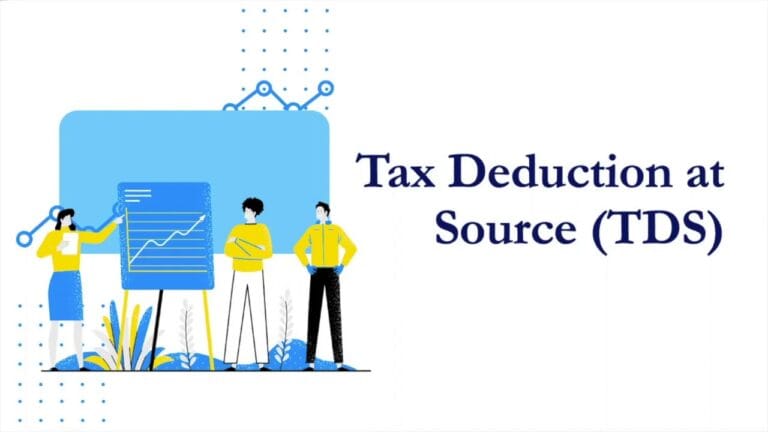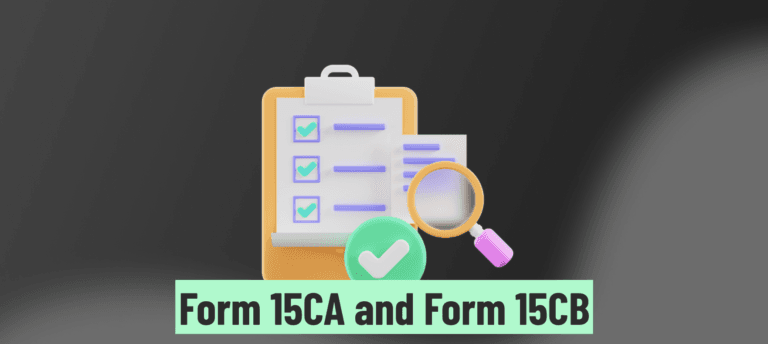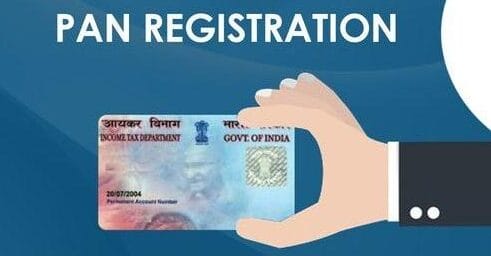Tax Deducted at Source (TDS) is a mechanism under the Indian Income Tax Act, 1961, wherein the payer deducts tax at a specified percentage from payments made to a payee and remits it to the government. Here’s an overview of TDS:
Purpose of TDS
- Collection of Revenue: Ensures regular collection of tax from income sources throughout the year, rather than a lump sum at the end.
- Income Tax Compliance: Facilitates compliance with income tax laws by ensuring tax payments are made at the time of income accrual.
- Tracking High-Value Transactions: Monitors and tracks high-value transactions and ensures tax transparency.
Applicability of TDS
TDS is applicable on various payments including:
- Salaries: TDS on salaries paid by employers.
- Interest: TDS on interest earned from banks, securities, etc.
- Rent: TDS on rent payments exceeding a specified limit.
- Commission: TDS on commission payments.
- Consultation Fees: TDS on professional or consultation fees.
- Contract Payments: TDS on payments made for contracts and agreements.
TDS Rates
Different payments attract different TDS rates as per the Income Tax Act. Rates may vary based on the nature of payment and the tax residency status of the payee.
TDS Deduction Process
- Tax Deductor Identification Number (TAN): The deductor (payer) needs to obtain a TAN from the Income Tax Department.
- TDS Deduction: Deduct TDS from payments at the applicable rates.
- Deposit: Deposit the deducted TDS to the government within the prescribed due dates.
- TDS Return Filing: File quarterly TDS returns providing details of TDS deducted, paid, and other relevant information.
- TDS Certificate Issuance: Issue TDS certificates (Form 16, Form 16A, etc.) to the payees detailing the TDS deducted.
TDS Certificates
- Form 16: TDS certificate issued by employers to employees detailing TDS deducted on salaries.
- Form 16A: TDS certificate issued for TDS on payments other than salaries.
- Form 16B: TDS certificate for TDS on sale of property.
- Form 16C: TDS certificate for TDS on rent.
Responsibilities of Deductor
- TDS Deduction: Deduct TDS at the correct rates and deposit to the government.
- TDS Compliance: File TDS returns accurately and on time.
- TDS Certificate Issuance: Issue TDS certificates to deductees.
Penalties for Non-Compliance
Failure to deduct or deposit TDS attracts penalties and interest under the Income Tax Act, 1961. Penalties also apply for late filing of TDS returns and non-issuance of TDS certificates.
TDS is a significant tool for tax collection and compliance under the Indian Income Tax Act. Businesses and individuals must adhere to TDS provisions to avoid penalties and ensure smooth tax operations. Professional advice and assistance can help in understanding TDS provisions and ensuring compliance with applicable regulations.
At Ujjwal Gupta & Co
We, at Ujjwal Gupta & Co, are dedicated to delivering personalized, high-quality solutions tailored to meet your financial and business needs. With our team of professionals and a client-first approach, we ensure that every challenge is met with expert guidance and strategic insight.
We are dedicated to ensuring your business’s success by providing best service practice available in the industry and that too at a cost effective pricing. Our team of experts is excited to work with you and provide the support you need to thrive in the Indian business landscape.
Our only motive is to create Value for Our Clients and accordingly, have a Client Value System at our Office.
So, let us help you navigate the complexities of finance and compliance, empowering you to focus on what matters most — growing your business. Get in touch today, and take the first step towards financial peace of mind.
TDS is a mechanism in which tax is deducted by the payer at the time of making specific payments such as salaries, rent, interest, commission, professional fees, etc., and is then deposited with the government. This ensures timely tax collection and reduces the burden on taxpayers at the time of filing income tax returns.
TDS must be deducted by individuals or entities making payments that are covered under the Income Tax Act, including employers, companies, partnerships, proprietorships, and individuals with a tax audit requirement. Certain payments, like salary, interest, professional fees, and rent, are subject to TDS deductions.
Common types of payments where TDS is applicable include:
- Salaries (Section 192)
- Interest on securities (Section 193)
- Dividends (Section 194)
- Rent payments (Section 194I)
- Contract payments (Section 194C)
- Professional or technical fees (Section 194J)
- Commission or brokerage (Section 194H)
The rate of TDS varies based on the type of payment. For example:
- Salaries: As per the individual’s applicable income tax slab.
- Rent: 10% for land/building (if rent exceeds ₹2.4 lakh annually).
- Professional Fees: 10% under Section 194J.
- Interest on securities: 10%.
- The exact TDS rates are specified under the Income Tax Act, and may change periodically.
TDS should be deducted at the time of making payments like salary, rent, interest, etc. Once deducted, it must be deposited with the government by the 7th of the following month (for non-salary payments) and before the 30th of April for salary TDS deducted in March (for salaried employees).
TAN (Tax Deduction and Collection Account Number) is a 10-digit alphanumeric number required by anyone responsible for deducting or collecting TDS. It is mandatory to quote the TAN while filing TDS returns and making TDS payments. Failure to obtain a TAN or using incorrect TAN can result in penalties.
- Form 16: This is a certificate issued by employers to employees, detailing the amount of TDS deducted from salary and deposited with the government. It includes salary details and tax deductions for the financial year.
- Form 16A: This is issued for TDS deducted on income other than salary, such as interest, professional fees, and rent. It details the amount deducted and deposited for the specific payments.
TDS returns are filed quarterly through the Income Tax Department’s e-filing portal. The returns provide details of the TDS deducted, the payee, and the amount deposited. Different forms are used based on the nature of the deduction:
- Form 24Q: For TDS on salaries.
- Form 26Q: For TDS on non-salary payments.
- Form 27Q: For TDS on payments to non-residents.
- A late filing fee of ₹200 per day is levied for delay in filing TDS returns, up to the maximum of the TDS amount.
- Penalty for not filing TDS returns ranges from ₹10,000 to ₹1,00,000.
- Interest is also charged for late deduction (1% per month) or late payment (1.5% per month) of TDS to the government.
TDS consultancy services assist businesses in ensuring compliance with TDS regulations, including:
- TAN registration.
- Accurate deduction and deposit of TDS.
- Timely filing of quarterly TDS returns (Form 24Q, 26Q, 27Q).
- Generation and issuance of TDS certificates like Form 16 and Form 16A.
- Advisory services for handling TDS notices or disputes.
- Reconciliation of TDS records with Form 26AS (TDS credit statement) to avoid discrepancies.
Why Choose UGC?

Client Centric Approach
Client is the key driver of our service offerings. Our approach to service offerings is based on a client centric and customized approach. Our specialized teams are a mix of technical and industry experience in order to serve clientele for their specific needs.

Team Work
We have built high performing teams supported by strong work ethic. Our team is a mix of experts, professionals and support staff from technical and varied academic, social and ethnic backgrounds. We believe diversification plays a vital role in motivating the team.

Quick Turnaround
We always endeavour for a quick turnaround time to serve our clientele. We are supported by an experienced and client focussed support teams to offer timely services to our clientele. In case of any business exigencies and time sensitive service requirements, you can always count on us.

Open Communications
We believe that open communication is the core principle in order to demonstrate trust, build long lasting and valuable relationships with clientele. We are committed to ensuring transparency in communication, service offerings and delivery. We provide professional services to our clients.

Client Value System
We value for the Client time and thus, we offer services that are value for money. Quality professional services are provided to our clients, so that they are able to achieve their desired results. We are a quality trademark in the industry and thus, our clients count on us always.

Quality in Delivering Work
Our service offerings are driven by quality and reviews at every level. We strive to provide a qualitative and value-added delivery to our clientele. At all times, we endeavour to provide exceptional client service by meeting client expectations and driving client satisfaction.




















